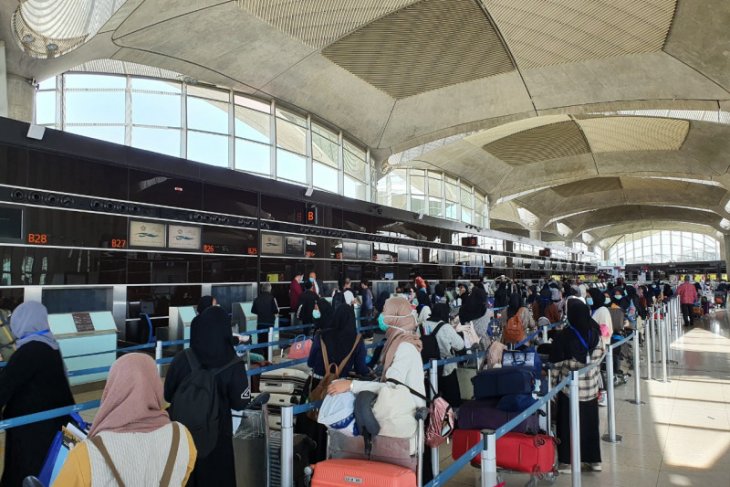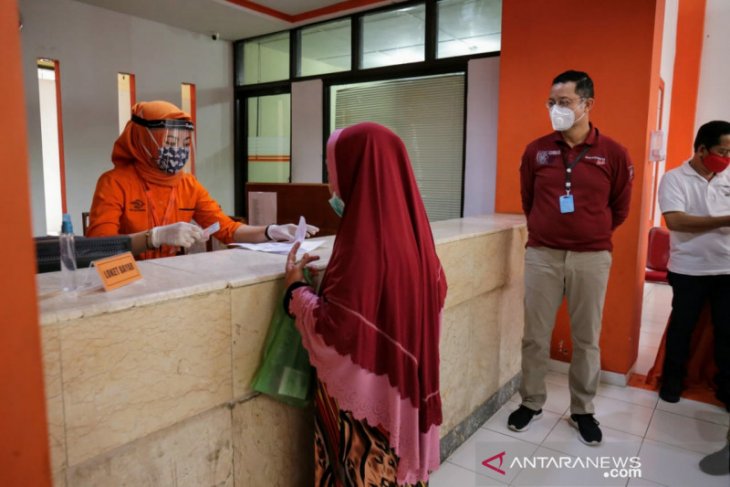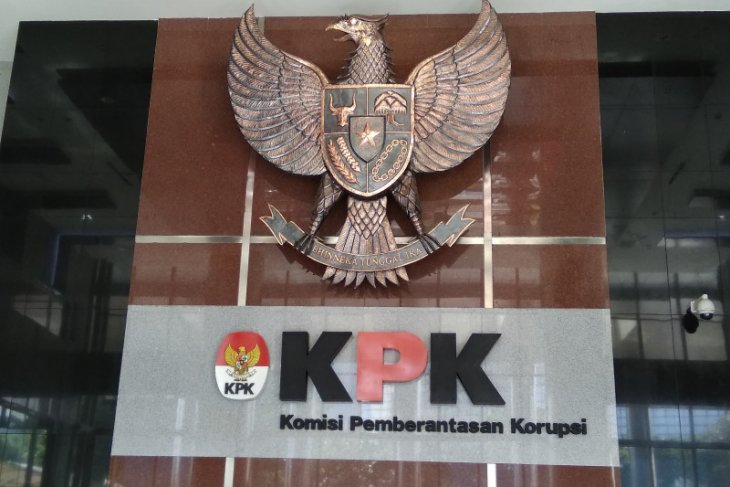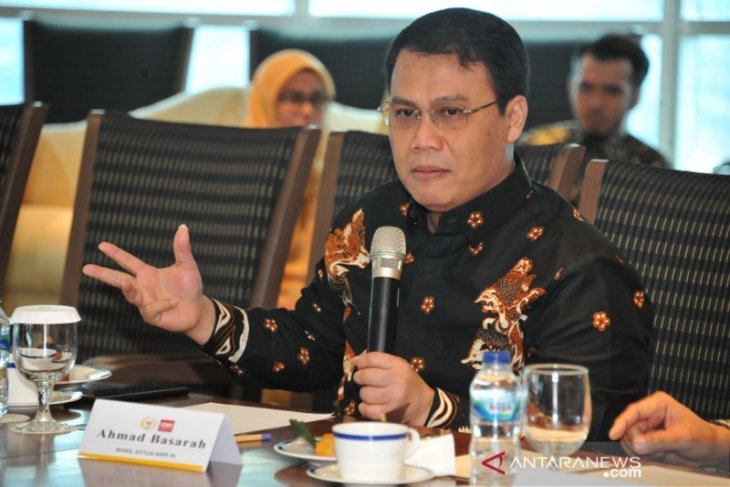Live Streaming
Program Highlight
Company Profile
June
Embassy Facilitates Repatriation of 74 Indonesians from Jordan
Written by Ani Hasanah
As many as 74 Indonesian citizens departed from the Queen Alia International Airport in Amman, Jordan's capital city, on Sunday (May 31, 2020), by boarding Qatar Airways' QF-956 flight and arrived in Jakarta on Monday (June 1, 2020). (ANTARA/HO-KBRI Amman)
Some 74 Indonesian citizens departed from the Queen Alia International Airport, Amman, Jordan's capital city, on Sunday, aboard Qatar Airways flight QF-956 and landed at the Soekarno Hatta International Airport in Cengkareng, Banten Province, Monday.
This self-initiated repatriation, involving students of the Nurul Fikri Islamic Boarding School, members of the Jamaah Tabligh congregation, and university students, who completed their studies, was facilitated by the Indonesian Embassy in Amman.
The returnees belonged to the Indonesian Embassy's second batch of the self-initiated repatriation mission, while the first batch of Indonesians affected by the ongoing global pandemic of the novel coronavirus disease (COVID-19) had returned home in April.
"In ensuring the state's presence since the onset, the Indonesian Embassy in Amman has facilitated the repatriation process based on its authority to ensure that our citizens can return home safely," Indonesian Ambassador to Amman Andy Rachmianto remarked.
Ambassador Rachmianto also bore witness to the departure of 74 Indonesians. The embassy, in cooperation with Qatar Airways, conducted the self-initiated repatriation of the second batch on Sunday.
"May this COVID-19 crisis soon end, so that our community members can resume their day-to-day activities in a new normal scenario," he stated.
The Indonesian government has continually striven to repatriate its citizens stranded abroad amid the ongoing COVID-19 pandemic over the past few months.
In Malaysia, some 4,800 undocumented Indonesian migrant workers will have been released from the country's immigration detention houses to then be repatriated to Indonesia since June 6.
The Malaysian Immigration and Foreign Ministry’s officials had discussed this repatriation-related plan with their counterparts from the Indonesian Embassy on May 28, Malaysian Defence Minister Sabri Yaakob stated in Putrajaya last weekend.
Prior to their repatriation, all Indonesians currently accommodated at several detention houses in the neighboring country will undergo examination using the Rapid Test Kit Antigen (RTK Antigen) method to diagnose for the presence of coronavirus.
The coronavirus disease, which initially hit the Chinese city of Wuhan at the end of 2019, has since then spread to at least 202 countries and territories, including Indonesia, with a huge spike in death toll.
The Indonesian government officially announced the country's first confirmed cases on March 2 this year. The ongoing COVID-19 pandemic has weakened the purchasing power of scores of Indonesian families, particularly those who lost their jobs. (ANTARA)
June
Government to Offer Assistance to COVID-19-Impacted Citizens until December
Written by Ani Hasanah Archive-Minister of Social Affairs, Juliari P. Batubara (right) observing the distribution of cash social aid to those affected by the COVID-19 pandemic in Central Java, Thursday (21/5/2020). ANTARA/HO-Social Ministry Public Relations)
Archive-Minister of Social Affairs, Juliari P. Batubara (right) observing the distribution of cash social aid to those affected by the COVID-19 pandemic in Central Java, Thursday (21/5/2020). ANTARA/HO-Social Ministry Public Relations)
Social Affairs Minister Juliari Peter Batubara revealed that the government will distribute social assistance to those impacted by the COVID-19 pandemic until December 2020.
"In accordance with the president's directives during a recent cabinet meeting, the social assistance will continue to be offered," he noted after attending a virtual ceremony held to commemorate Pancasila Day in Jakarta on Monday.
The government is preparing to continue to distribute social assistance to people affected by the COVID-19 pandemic. The assistance comprises basic necessities for those residing in the Jakarta, Bogor, Depok, Tangerang, and Bekasi (Jabodetabek) area as well as cash social assistance for those living outside the area.
During the pandemic, the government has distributed social assistance to the people apart from regular programs, such as the Family Hope Program (PKH) and Non-Cash Food Aid (BPNT).
Some of the forms of assistance include packages of basic necessities, cash social aid, and direct cash assistance from village budgets for those impacted by the COVID-19 pandemic.
The minister remarked that currently, distribution of the third stage of basic food assistance was complete and would continue to the next stage of aid distribution. The disbursal of cash social assistance is also partially complete.
"The first phase of social assistance has been completed and the second and third stages will follow thereafter," Batubara stated.
The minister pointed out that the nation's vast geographical landscape and varying conditions had impeded quick distribution of social assistance to pandemic-affected communities and made the process more challenging.
Batubara highlighted the government’s continued endeavors to improve the distribution of social assistance based on the results of evaluation of the initial stages.
He emphasized that social assistance pertaining to COVID-19 countermeasures was only provided to pandemic-affected individuals, who were not recorded as recipients of social assistance in the government's regular aid program. The distribution of aid will be halted after the pandemic ends. (ANTARA)
June
Essence of Pancasila's Values should be Adopted to Fight COVID-19
Written by Ani HasanahDeputy Speaker of the People's Consultative Assembly (MPR) Ahmad Basarah (ANTARA/HO)
The spirit of "gotong royong," or mutual cooperation, is intrinsic to the Pancasila state ideology's values that Indonesia should adopt in its collective endeavors to fight the novel coronavirus disease (COVID-19) pandemic, a legislator stated.
The values of Pancasila are applicable in the nation's fight against the COVID-19 crisis, Deputy Speaker of the People's Consultative Assembly (MPR) Ahmad Basarah stated in Jakarta on Monday while speaking during the commemoration of Pancasila Day.
"As a nation, Indonesia has had tremendous ideological and sociological capital that can be developed to foster social participation and serve as a source of energy to deal with the COVID-19 pandemic and its socio-economic impacts," he noted.
However, the Indonesian society can develop this collective strength if the central and regional governments work along with other stakeholders of the nation to capitalize on the people's ideological and sociological capital, Basarah remarked.
June 1 marks the commemoration of the birth of the state ideology of Pancasila. To this end, President Joko Widodo (Jokowi) held a virtual commemorative event at the Bogor Presidential Palace on Monday.
In his address to the nation, Jokowi affirmed that Pancasila functions as a guiding beacon to enliven the spirit of the Indonesian people's nationhood, mutual care and cooperation, and brotherhood in their pursuit to win the fight against the COVID-19 pandemic.
Jokowi reiterated that the COVID-19 pandemic has tested the endurance of Indonesians in their collective struggle.
The coronavirus pandemic has also tested the endurance of the nation's sacrifice, discipline, obedience, and mental fortitude in preparing apt and swift policies to respond to the challenges posed in this difficult time, he noted.
"In facing this test, Pancasila remains a guiding beacon to push us all to continue to forge ahead, stand united, be caring and sharing, and strengthen our nationhood," he noted at the virtual event in which the participants comprised Vice President Ma'ruf Amin and cabinet members.
The values of Pancasila have become a source of encouragement to uplift the spirit of the entire nation to reduce its common burden and rekindle the fighting spirit and endurance in dealing with difficulties and challenges, he stated.
Apart from Vice President Amin, Head of the Agency for Pancasila Ideology Education's (BPIP's) Advisory Council Megawati Soekarnoputri, House of Representatives’ Speaker Puan Maharani, and cabinet members also partook in the commemorative event.
The coronavirus disease, which initially hit the Chinese city of Wuhan at the end of 2019, has since spread to at least 202 countries and territories, including Indonesia, with a huge spike in death toll.
The Indonesian government officially announced the country's first confirmed cases on March 2 this year. The ongoing COVID-19 pandemic has weakened the purchasing power of scores of Indonesian families, particularly those who lost their jobs.
In dealing with this difficult situation, President Jokowi has repeatedly highlighted the importance of fostering the spirit of "gotong royong," arguing that the government cannot work alone to fight the spread of coronavirus infections. (ANTARA)
June
Corruption Betrays Values of Pancasila: Anti-Graft Body Chief
Written by Ani Hasanah Logo of the Indonesian Corruption Eradication Commission. (ANTARA/Benardy Ferdiansyah)
Logo of the Indonesian Corruption Eradication Commission. (ANTARA/Benardy Ferdiansyah)
Chairman of the Corruption Eradication Commission, Firli Bahiro, stressed that committing corruption was tantamount to betrayal of the values enshrined in the nation's state ideology of Pancasila.
"Bear in mind that daring to commit corruption is equivalent to betraying the values contained in every principle in Pancasila," he noted in a statement received in Jakarta on Monday during the commemoration of the 75th Pancasila Day falling on June 1.
According to the first stipulation of Pancasila, encompassing five core philosophical ideologies of the state, “Belief in God Almighty” translates to fearing corrupt behavior and being hopeful of being spared from the intent, temptation, and acts of corruption, he remarked.
"This is since we are certain that the Almighty is watching our every step, demeanor, and act in this temporary world," he noted.
The ability to restrain one's self from partaking in corrupt behavior for fear of sin makes fair and civilized human beings that falls in line with the second ideology of Pancasila.
"The spirit and implementation of the essence of the first and second precepts can be the goal of the third precept, the Unity of Indonesia, in eradicating the culture of corruption that has taken root in this country," he noted.
The war against corruption must be fought through wisdom as is the essence of the fourth precept of Pancasila.
Bahiro noted that the people would certainly hope, dream, and aspire to eradicate corruption in Indonesia for the sake of social justice for all Indonesians, which is contained in the fifth precept of Pancasila.
"Once again, the meaning, essence, and values of the five points of Pancasila form a unified whole and bind to one another, and their meaning should serve as the basis of life for the nation and state," he noted.
He further remarked that the Commission had recently forged cooperation with several state institutions, including the People's Consultative Assembly (MPR), to engrain and follow the values of Pancasila in the efforts to eradicate corruption.
He believed that Pancasila Day should be interpreted in a bid to eradicate corruption, which should pose a serious concern for all elements of the nation, as corruption clearly violates the basic principles of Pancasila.
"Only by practicing the precepts of Pancasila would the anti-corruption sword blades be able to pierce the latent heartbeat of corruption," he affirmed.
Pancasila, as the basis of the state and the way of life of the nation, as well as the people of Indonesia are noble values that emerged out of the nation's culture.
"Pancasila is not solely for memorization, but we shall practice the noble values enshrined in it," Bahuri emphasized. (ANTARA)



